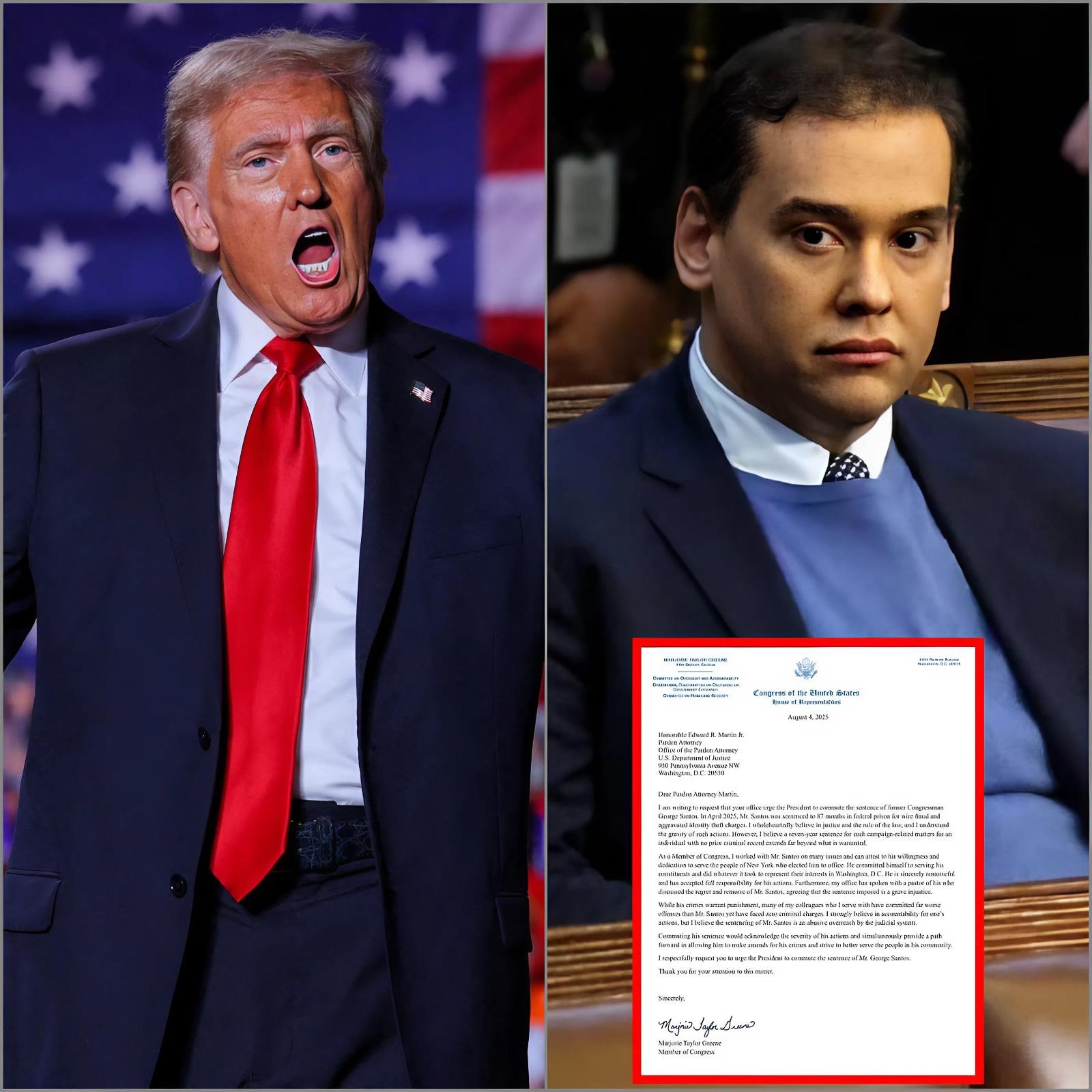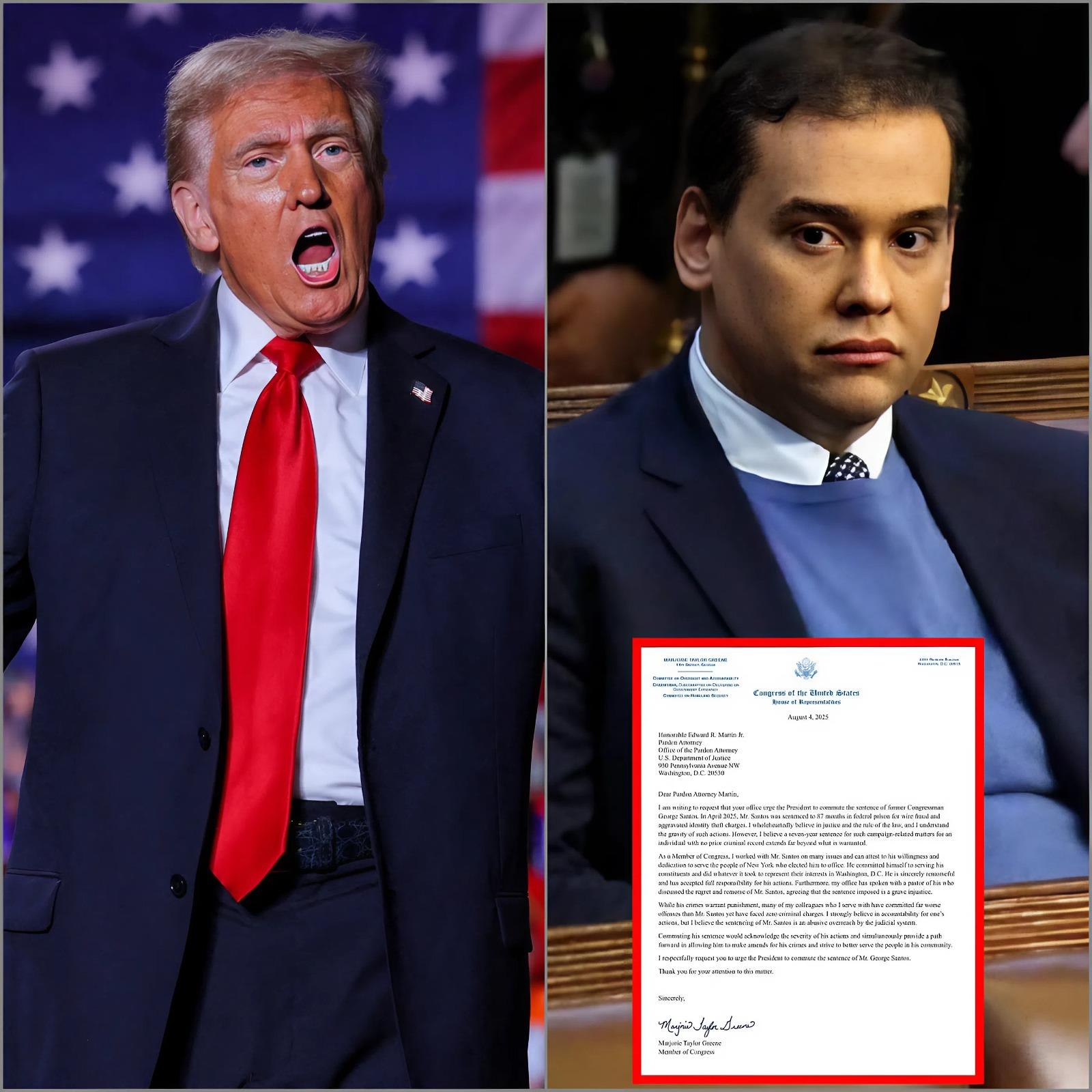On August 4, 2025, Representative Marjorie Taylor Greene, a Republican from Georgia, made headlines by publicly urging President Donald Trump to commute the prison sentence of former Congressman George Santos. In a letter addressed to the Office of the Pardon Attorney, Greene described Santos’s 87-month sentence for wire fraud and aggravated identity theft as a “grave injustice” and an example of unequal treatment under the law. Her appeal, announced via a post on X, has reignited debates about judicial fairness, political loyalty, and the use of presidential clemency powers.

George Santos, once a rising star in the Republican Party, became a polarizing figure after his 2022 election to Congress. As the first openly gay Republican elected to the House as a non-incumbent, his victory was initially celebrated as a milestone. However, his tenure was marred by revelations of extensive fabrications about his personal and professional background, including false claims about his education, employment, and heritage. These lies, coupled with allegations of financial misconduct, led to a 23-count federal indictment. In April 2025, Santos pleaded guilty to wire fraud and aggravated identity theft, resulting in his expulsion from Congress in December 2023 and a seven-year prison sentence. He began serving his term at the Federal Correctional Institution in Fairton, New Jersey, on July 25, 2025.
Greene’s letter argues that Santos’s punishment is disproportionate, particularly when compared to other members of Congress who, she claims, have committed “far worse offenses” yet face no legal consequences. She provides no specific evidence to support this assertion, a point that has drawn criticism from observers who view her stance as politically motivated. Greene emphasizes Santos’s lack of prior criminal history and claims he has shown remorse, citing conversations with a religious leader who supports her view. She frames his crimes as campaign-related missteps rather than the extensive fraudulent schemes detailed by federal prosecutors, who accused Santos of defrauding donors, falsifying campaign finance records, and stealing identities to fund his 2022 campaign.
The call for clemency comes on the heels of President Trump’s comments to Newsmax, where he acknowledged his authority to pardon Santos but noted that no one had formally requested it. Trump described Santos as a staunch supporter, saying, “He was 100% for Trump,” though he admitted to having little personal acquaintance with him. This alignment with Trump’s agenda appears central to Greene’s advocacy, as she has consistently defended Santos, even during his tumultuous congressional tenure. Her support contrasts with the broader Republican response, as over 100 GOP members joined Democrats in voting to expel Santos, marking a rare bipartisan rebuke.
Critics of Greene’s request argue that Santos’s sentence reflects the severity of his crimes. U.S. Attorney John Durham, appointed by Trump, hailed the conviction as a victory for justice, stating that Santos was held accountable for “a mountain of lies, theft, and fraud” that harmed donors, political parties, and constituents. Federal prosecutors highlighted Santos’s lack of genuine remorse, pointing to his post-conviction social media posts where he accused the Justice Department of protecting “a cabal of pedophiles” while targeting him unfairly. These statements, they argued, demonstrated a risk of recidivism, justifying the 87-month sentence.

Santos himself has been vocal about seeking clemency, filing paperwork and publicly appealing to Trump on platforms like X and in interviews. He has oscillated between expressing regret and defiance, describing his prison experience as a “punch to the gut” in a letter published by the South Shore Press. Despite his guilty plea, Santos’s attempts to reframe his actions as campaign-related errors have been met with skepticism, particularly by those like Peter Hamilton, a former acquaintance who accused Santos of personal financial deceit.

Greene’s push for a commutation raises broader questions about the consistency of justice in political spheres. Her claim of unequal treatment echoes sentiments among some conservative circles, but without evidence, it risks being seen as a defense rooted in political allegiance rather than principle. As of now, the White House has not indicated whether Trump will act on Greene’s request, leaving Santos’s fate uncertain as he navigates his sentence. The controversy underscores the complex interplay of loyalty, accountability, and power in American politics.







